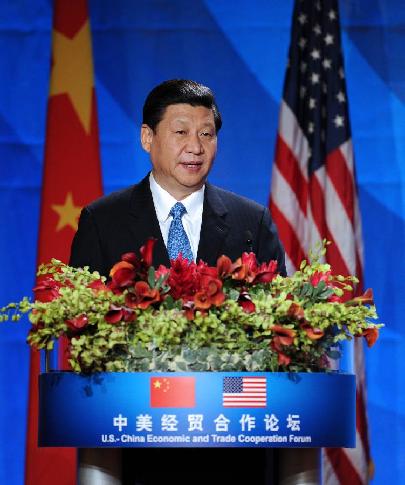Chinese vice-president's U.S. tour hailed as future-oriented landmark
- By Wu Liming, Qian Tong, Huo Xiaoguang
 0 Comment(s)
0 Comment(s) Print
Print E-mail Xinhua, February 19, 2012
E-mail Xinhua, February 19, 2012
|
Chinese Vice President Xi Jinping delivers a speech during the opening of the U.S.-China Economic and Trade Cooperation Forum in Los Angeles, the United States, Feb. 17, 2012. [Xinhua/Zhang Duo] |
ADVANCING ECONOMIC COOPERATION
The United States and China are the two biggest economies in the world, and both are each other's second largest trading partners. Statistics show that the bilateral trade volume in 2011 stood at 446.6 billion dollars and will exceed 500 billion dollars this year.
Promoting trade and economic cooperation between the two countries was a vital part of Xi's tour.
Over the past five days, Xi attended a roundtable of Chinese and U.S. business leaders in Washington, addressed a forum on agricultural cooperation in Des Moine, and a business forum in Los Angeles. He also visited a farm in the suburb of Des Moines and the China Shipping terminal at the Port of Los Angeles.
On various occasions, Xi called on the United States to adjust its economic policies and structure to address the China-U.S. trade imbalance.
Over the past 33 years since the establishment of diplomatic relations between China and the United States, China-U.S. trade has increased by over 180 times.
China has become the fastest growing export market for the United States, Xi said, adding that U.S. exports to China have grown by 468 percent in the last 10 years.
Xi pointed out that both China and the United States have benefited from their growing business ties over the past four decades.
Addressing the opening session of the China-U.S. Economic and Trade Cooperation Forum held in Los Angeles, Xi rejected the view suggesting that China is the winner and the United States the loser in bilateral economic and trade relations.
"Such a view does not square with facts," Xi said.
"Both China and the United States are winners. This is a truly win-win situation," the vice-president said.
The large import of quality and inexpensive goods from China has helped the American people improve their real spending power and living standards and contributed to the efforts of the United States to maintain growth, Xi said.
According to the findings of the U.S.-China Business Council, economic cooperation and trade with China has served to propel economic growth and to keep consumer prices relatively low in the United States. Business cooperation with China has, in effect, added an extra 1,000 dollars to the annual disposable income of each American household.
In addition, the growing China-U.S. business ties have created lots of job opportunities in the United States, Xi said.
Available statistics show that between 2001 and 2010, over 3 million new jobs were created in the United States thanks to exports to China, he said.
During the tour, China and the United States jointly released a fact sheet on strengthening U.S.-China economic relations, promising to open more fields and work out more measures to facilitate bilateral economic cooperation.
On the sideline of Xi's visit, China sent six business-promotion delegations consisting of more than 500 Chinese business leaders to visit 11 cities across the U.S.. The delegations have signed as many as 149 contracts and cooperation agreements worth 38.6 billion dollars, including deals of purchasing U.S. goods and equipment with a total value of 27 billion dollars.
No wonder U.S. Commerce Secretary John E. Bryson admitted that booming Chinese economy has facilitated the sharp increase of U.S. exports to China, and China's decision to further open insurance market is good news.






